TYLER COWEN , a professor of economics at George Mason University, writes regularly for the New York Times and Money, and has contributed to numerous publications including the Wall Street Journal, the Washington Post, and Slate.com.
Engaging, creative, and every page makes you think differently about the world. The book quickly surprised me. I read Tyler every day and didnt anticipate the turn it took on page one. It was so surprisingand the surprise is a pleasant onethat I dont feel I should say more. Except: Recommended.
Examines how new ways of organizing information online are changing the way we think and the economy.
Cowen combines his passionseconomics and art.
Tyler Cowen needs no introductionhe is perhaps the worlds most prolific econoblogger. Tylers contributions to public knowledge are many. One of the most impressive things about Tyler is his ability to speak intelligently on a wide variety of topics. This is probably due in part to his well-known ability to read and process information unusually quickly.
In this provocative study of behavioral economics, Cowen reveals that autistic tendencies toward classification, categorization, and specialization can be used as a vehicle for understanding how people use information. Cowens illustration of our neurological filing system may help readers understand the mass consumption of information and just about everything else.
Will open your mind to thinking differently. The unique thought processes of individuals on the autism spectrum provide a great value to our world. This book will help you to be smart and successful in your own way.
The modern world bombards us with data just begging to be organized, from iPod playlists to digital vacation photos. Tyler Cowen offers an entertaining guided tour of our unprecedented information age, pondering implications for how creative we are, how long our attention span is, how our politics work, and the future of our economy.
Samuel R. Sommers, assistant professor of psychology, Tufts University
THE AGE OF
THE INFOVORE
SUCCEEDING IN THE INFORMATION ECONOMY
Tyler Cowen
Previously published as Create Your Own Economy

A PLUME BOOK
PLUME
Published by the Penguin Group
Penguin Group (USA) Inc., 375 Hudson Street, New York, New York 10014, U.S.A.
Penguin Group (Canada), 90 Eglinton Avenue East, Suite 700, Toronto, Ontario, Canada M4P 2Y3 (a division of Pearson Penguin Canada Inc.); Penguin Books Ltd., 80 Strand, London WC2R 0RL, England; Penguin Ireland, 25 St. Stephens Green, Dublin 2, Ireland (a division of Penguin Books Ltd.); Penguin Group (Australia), 250 Camberwell Road, Camberwell, Victoria 3124, Australia (a division of Pearson Australia Group Pty. Ltd.); Penguin Books India Pvt. Ltd., 11 Community Centre, Panchsheel Park, New Delhi 110 017, India; Penguin Group (NZ), 67 Apollo Drive, Rosedale, North Shore 0632, New Zealand (a division of Pearson New Zealand Ltd.); Penguin Books (South Africa) (Pty.) Ltd., 24 Sturdee Avenue, Rosebank, Johannesburg 2196, South Africa
Penguin Books Ltd., Registered Offices: 80 Strand, London WC2R 0RL, England
Published by Plume, a member of Penguin Group (USA) Inc. Previously published in a Dutton edition as Create Your Own Economy.
First Plume Printing, July 2010
Copyright Tyler Cowen, 2009
All rights reserved
 REGISTERED TRADEMARKMARCA REGISTRADA
REGISTERED TRADEMARKMARCA REGISTRADA
The Library of Congress has catalogued the Dutton edition as follows:
Cowen, Tyler.
Create your own economy: the path to prosperity in a disordered world / Tyler Cowen.
p. cm.
Includes bibliographical references and index.
ISBN: 978-1-101-43299-0
1. EconomicsPsychological aspects. 2. Creative thinking. I. Title.
HB74.P8C68 2009
330.019dc22 2009006935
Original hardcover design by Daniel Lagin
Without limiting the rights under copyright reserved above, no part of this publication may be reproduced, stored in or introduced into a retrieval system, or transmitted, in any form, or by any means (electronic, mechanical, photocopying, recording, or otherwise), without the prior written permission of both the copyright owner and the above publisher of this book.
PUBLISHERS NOTE
The scanning, uploading, and distribution of this book via the Internet or via any other means without the permission of the publisher is illegal and punishable by law. Please purchase only authorized electronic editions, and do not participate in or encourage electronic piracy of copyrighted materials. Your support of the authors rights is appreciated.
BOOKS ARE AVAILABLE AT QUANTITY DISCOUNTS WHEN USED TO PROMOTE PRODUCTS OR SERVICES. FOR INFORMATION PLEASE WRITE TO PREMIUM MARKETING DIVISION, PENGUIN GROUP (USA) INC., 375 HUDSON STREET, NEW YORK, NEW YORK 10014.
PREFACE
W hen the economy is doing poorly, people cocoon and turn to less expensive pleasures. During the Great Depression of the 1930s, people cut back on the expensive evening out and looked to board games, radio, and family entertainment at home. People learned how to do more with less and those tendencies shaped American life for decades. The Great Depression wasnt just an economic event; it was also a cultural shift. And there is another cultural shift going on right now. In bad economic times people exercise more, eat out less and cook more, and engage in more projects for self-improvement and self-education. Usage at public libraries goes up and people will spend more time on the internet; (after all, once youve paid for your connection most of the surfing is free). These trends are more important than most of us realize and in this book I will tell you why. I will tell you why they are not just short-run trends but why they presage something much deeper about our future and about how we use information.
The challenge is this: When a recession comes, rather than surrendering, what can we do to empower ourselves and create a better life? What technologies can we use and how? How can we use information in a more powerful way? To whom should we look as the new role models and the new heroes? How can we turn inward and improve who we are and how we organize our internal personal worlds?
This book is about the power of the individual to make a difference and also to change an entire world, whether or not the supposed economic forces are on your side. To thrive in an era that produces and devours information like never before, you need to become more adept at finding, sorting, and absorbing ideas, news, and all kinds of data. The age of the infovore has arrived.
THE AGE OF THE INFOVORE
What lies behind us and what lies ahead of us are tiny matters compared to what lives within us.
UNKNOWN SOURCE
THE FUTURE OF THINKING DIFFERENTLY
T his book begins and ends with the idea of the value and the creative power of the individual. That is the ultimate driver of prosperity in the modern world; it is the power that can get you the best things in life. Our tour in the middle will visit society, technology, politics, economics, culture, and the internet, but the first step on this journey will be one of self-discovery.


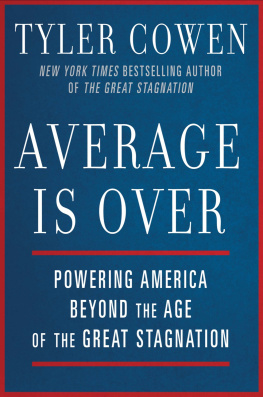
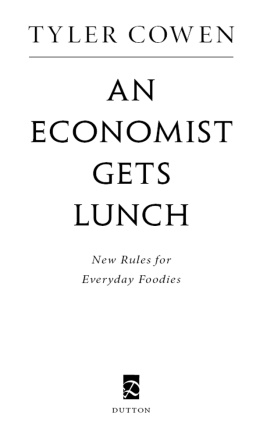


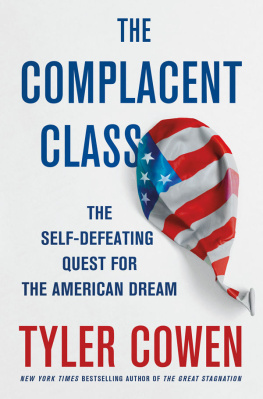
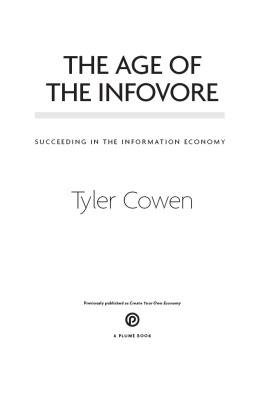
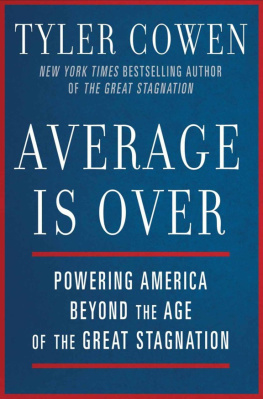
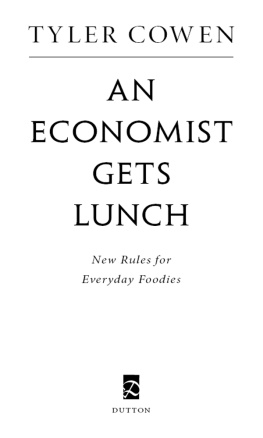



 REGISTERED TRADEMARKMARCA REGISTRADA
REGISTERED TRADEMARKMARCA REGISTRADA